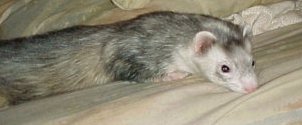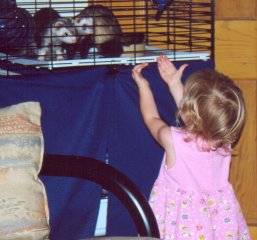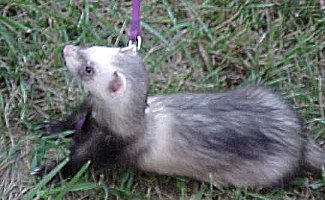
Carter says, "What's a wild animal?"
| ~ Common Misconceptions about Ferrets ~ |
 Carter says, "What's a wild animal?" |
![]() "They are vicious and should only be handled with gloves." ...FALSE! Like most animals, ferrets will defend themselves by biting if they feel threatened, and if they have been abused or neglected, they may bite out of fear. Also like many animals, such as dogs and cats, ferrets play with their teeth. This means that, like dogs, ferrets require training and should never be left unsupervised with babies or small children. And yes, there can be exceptions -- occasionally, there will be an aggressive ferret, just as there are occasionally aggressive dogs or cats. However, just like dogs, the vast majority of domesticated ferret kits grow up to be gentle, loving companion animals.
"They are vicious and should only be handled with gloves." ...FALSE! Like most animals, ferrets will defend themselves by biting if they feel threatened, and if they have been abused or neglected, they may bite out of fear. Also like many animals, such as dogs and cats, ferrets play with their teeth. This means that, like dogs, ferrets require training and should never be left unsupervised with babies or small children. And yes, there can be exceptions -- occasionally, there will be an aggressive ferret, just as there are occasionally aggressive dogs or cats. However, just like dogs, the vast majority of domesticated ferret kits grow up to be gentle, loving companion animals.
 Interaction between babies/small children and all animals should always be supervised by an adult! |
![]() "They are rodents, like squirrels or rats." ...FALSE! Ferrets are members of the taxonomic family Mustelidae, which essentially makes them weasels. Their closest relatives are, therefore, other weasels: mink, ermine, black-footed ferrets, and polecats, to name a few. They are also less closely related to other members of Mustelidae, such as otters and badgers. Click here for comparison photos.
"They are rodents, like squirrels or rats." ...FALSE! Ferrets are members of the taxonomic family Mustelidae, which essentially makes them weasels. Their closest relatives are, therefore, other weasels: mink, ermine, black-footed ferrets, and polecats, to name a few. They are also less closely related to other members of Mustelidae, such as otters and badgers. Click here for comparison photos.
![]() "They carry rabies and cannot be vaccinated." ...FALSE! There is a rabies vaccine that is approved and effective for ferrets, and recent studies have proven conclusively that ferrets are no more at risk for either contracting rabies or for spreading it to humans than are dogs and cats. The Centers for Disease Control now recommends that ferrets be treated exactly like dogs and cats when rabies is suspected or a bite has occurred. This means they should be quarantined for a period
"They carry rabies and cannot be vaccinated." ...FALSE! There is a rabies vaccine that is approved and effective for ferrets, and recent studies have proven conclusively that ferrets are no more at risk for either contracting rabies or for spreading it to humans than are dogs and cats. The Centers for Disease Control now recommends that ferrets be treated exactly like dogs and cats when rabies is suspected or a bite has occurred. This means they should be quarantined for a period
 Xena says, "I can't ruin the ecology -- I'm fixed and I only go out on a leash!" |
![]() "They will form feral colonies and ruin the ecology." ...FALSE! Most domesticated ferrets, especially those who have been beloved pets, cannot survive out of doors for very long. If a lost ferret is not very quickly found, his or her chances for survival are very poor. Also, the vast majority of pet ferrets in the United States have been spayed or neutered and are incapable of producing offspring, thus making it patently impossible for a feral colony to become established!
"They will form feral colonies and ruin the ecology." ...FALSE! Most domesticated ferrets, especially those who have been beloved pets, cannot survive out of doors for very long. If a lost ferret is not very quickly found, his or her chances for survival are very poor. Also, the vast majority of pet ferrets in the United States have been spayed or neutered and are incapable of producing offspring, thus making it patently impossible for a feral colony to become established!